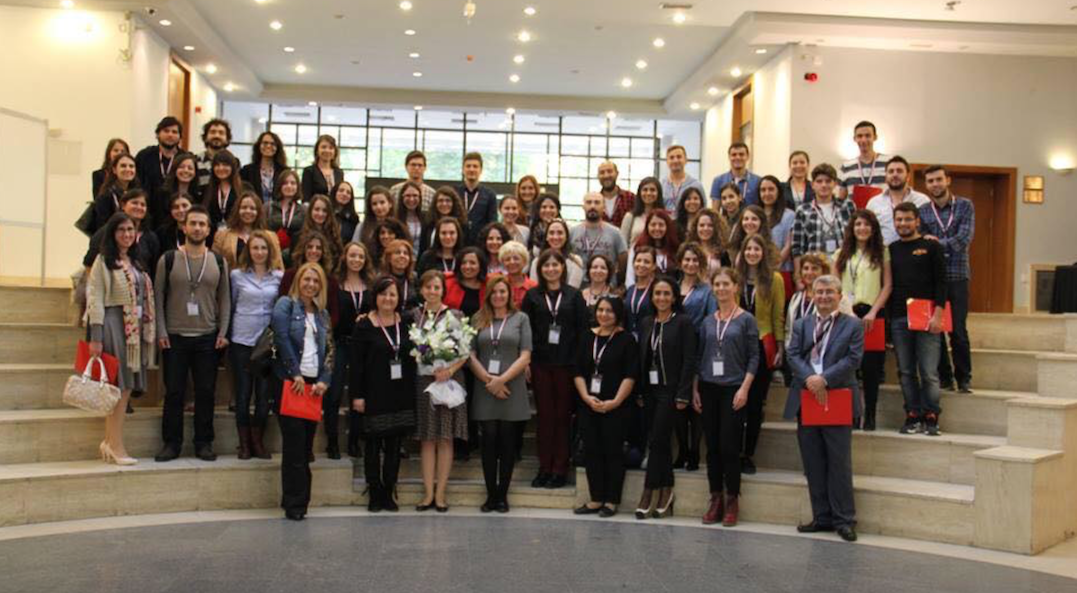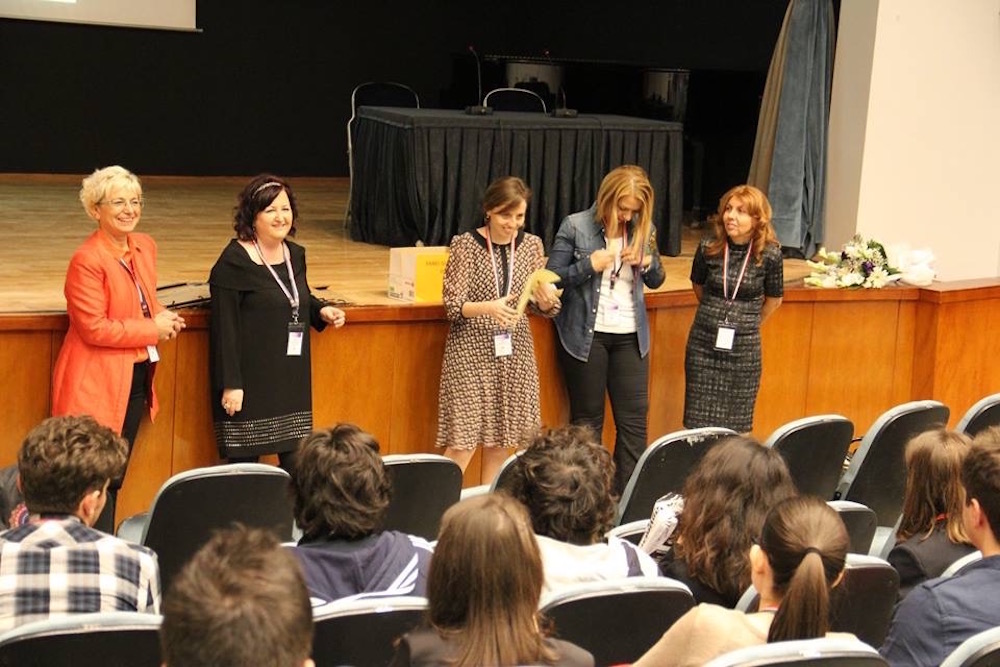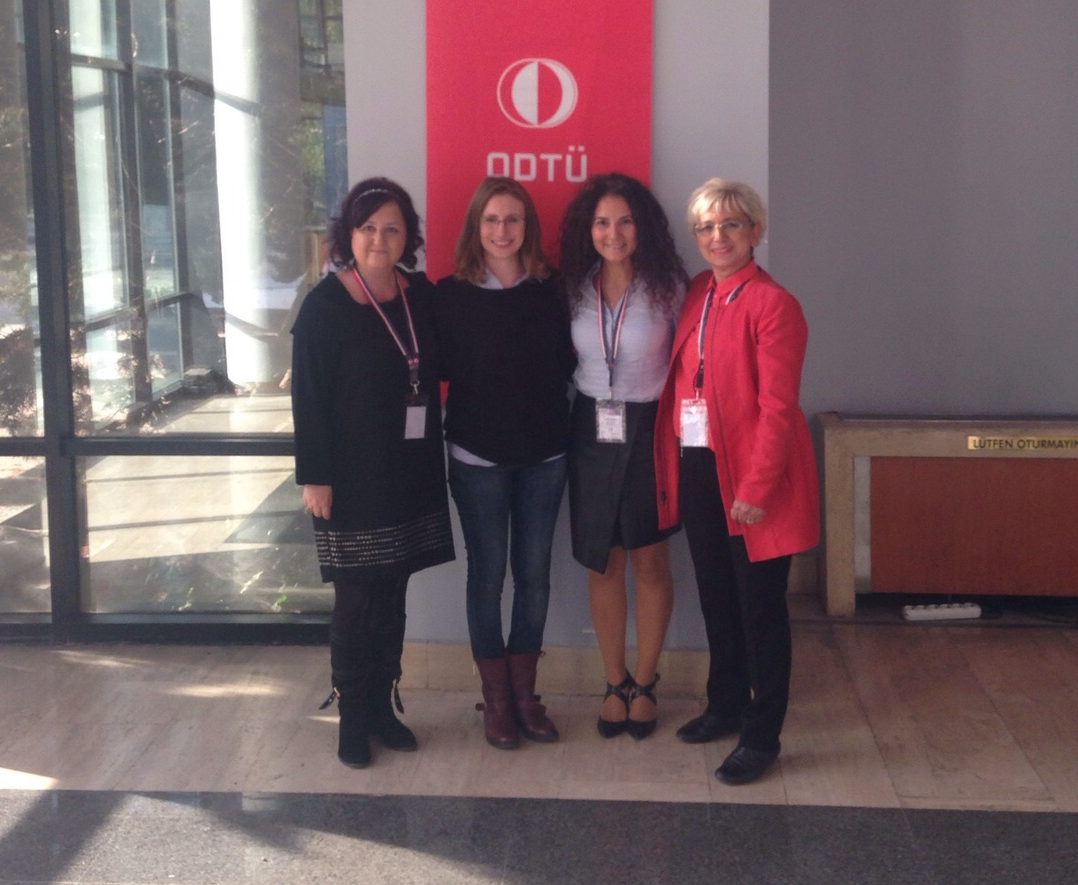Reflections on SLTEP @ Pre-Service @ METU

Reflections on SLTEP @ Pre-Service @ METU
Vildan Çal, Celile Gürsu, Meral Güçeri, Deniz Kurtoğlu Eken
SLTEP@Pre-Service: One-Day Event with Student-Teachers and Alumni Meeting was held at METU in Ankara on October, 17th. The event also marked the completion of the 11th year of the School of Languages Trainer Education Program (SLTEP).
The event provided a unique professional development opportunity for student teachers and new graduate teachers at METU and several other universities in Ankara and an exciting opportunity for all alumni members to meet again. By bringing both experienced and novice teachers together, the event turned into a unique experience for all participants. SLTEP participants presented workshops on various topics in ELT and student teachers contributed to the event with their research presentations.
The event started with a welcome speech by Deniz Şallı Çopur, the initiator of the idea of organizing a conference for student teachers. The plenary speech was given by Deniz Kurtoğlu Eken on, “Making a difference…Professional development for student teachers” focusing on strengths, challenges and areas of potential for student teachers and an exploration of the principles and ways with which they can equip themselves more resourcefully for the teaching profession. There were three concurrent sessions followed by student teachers’ research presentations. These poster presentations focused on a variety of areas such as students’ perspectives on group work; the effect of stress on students’ academic success and the relationship between microteaching and school experience.
At the end of the event, a fruitful panel session was chaired by Deniz Şallı Çopur, involving Deniz Kurtoğlu Eken , Meral Güçeri, a former SLTEP participant Yaprak Güleç Öğütçü and Işıl Günseli Kaçar as panelists. In the panel, student teachers and other SLTEP participants were given a chance to ask questions and share their experiences. Celile Gürsu and Vildan Çal were also involved in concurrent sessions with their presentations focusing on the use of technology, specifically mobile devices and differentiated instruction in ELT.
Below are some highlights from the presentations we attended.
Yeşim Nalkesen’s session was entitled The Impact of “Happiness” on Students’ Learning and How to Make This “Happen”? Yeşim started her session quoting from Csikszentmihalyi (1990) “happiness is not a fixed state but can be developed as we learn to achieve flow in our lives.” She continued highlighting the role of happiness in the classroom in relation to flow theory and how it is relevant to classroom applications. She suggested numerous technological tools and activities to go with them.
Jonathan Donnellan, Melek Didem Beyazoğlu, Hande Günel, Rhett Schools & Büşra Tan shared tasks and activities they designed to emphasise the role of peer response in academic writing. They reflected student frustrations when they were asked to write an essay, follow the process of writing and finally edit each other’s paper. The presenters stated that when students experience boredom, this has an impact on teacher motivation as well. Then, they shared the tasks and activites that they designed to encourage students to give peer response. They offered a useful three step peer feedback approach with hands on experience for the participants that could be used in the classroom by employing guiding questionnaires, correction keys and simplified rubrics.
The session entitled “Breaking the Boundaries of the Ready-Made Course Material” by Gamze Öncül focused on the importance of authenticity in ready-made materials. Gamze emphasized that using activities and materials that are drawn from the learners’ lives outside of school foster meaningful learning and engage students in class work. Her session was really interesting in terms of providing us with some insight into how teachers could make use of everyday objects to add variety and fun into their teaching. She suggested making use of real life objects such as bus tickets, city maps, tourist information booklets, detective stories from magazines and authentic video clips from TV shows and documentaries. She called all these materials “real life puzzles” and showed some examples of her lesson plans where students tried to solve the mystery in a detective story or find the relevant information in a trip advisor webpage to answer the questions.
2013 SLTEP participant Dinçer Demir presented a session called “Building Bridge Between Theory and Practice of 21st Century Skills”. In his workshop he talked about how 21st century skills in teaching have changed the way we teach and learn. He stressed the importance of being a lifelong learner to keep up with the new skills and meet students’ expectations. There was a discussion about how and to what extent technology could be integrated into our teaching and he went on saying that 21st century skills weren’t just limited to the use of technology. Dinçer usefully showed participants how he made use of the simplified version of the universal declaration of human rights as a part of his lesson plan. He concluded that teachers could enhance learning and intrinsic motivation by keeping themselves up-to-date with current issues all around the world and integrating these issues into their teaching context.
Kerem Selçuk’s session, “Have Your Say in One Way or Another” focused on strategies and activities that can cater for the needs and interests of different learners. He started the session by describing the “student” Kerem which was completely different from who he is now. His description enabled all the participants to personalize and relate themselves to the topic. The session was interactive and fun, enabling participants to generate ideas on how learners with different learning styles and different motivation levels can be encouraged to have their say in our classes. He ended his session with an engaging activity “Ask the Expert” adapted from How to Teach English, by Jeremmy Harmer.
Pelin Küçük shared her experience of using energizers and roleplays in her classes. Her tips were very useful in terms of addressing students’ sleepy moods especially in the morning sessions. She pointed out that although these activities seem childish, adult learners enjoy them very much. She shared some video shots and pictures from her lessons to show us how engaged her students were. Pelin’s point was that teachers should use these brief interventions to help students ‘to clear their minds’, to re-create personal and group energy, or for transition purposes.
The session entitled Art in EFL by Metar Aksoy focused on the role of art in teaching and learning and provided inspiring examples of how teachers can engage and motivate students through tasks involving great works of art. Metar also presented the process and approach she uses in her classes; with the guidance of the teacher, students are asked to present great works of art consisting mainly of paintings and share their experiences and choices through Prezi presentations.
What follows are some exciting reflections from the student teachers who participated in the event.
“When I first saw the event poster, I had no idea about what SLTEP is and what it is for. I can honestly say that it is not possible to gain the impression about SLTEP so deeply anywhere else. It’s impressive to see that SLTEP is like a family. They’re so cool”
“Frankly, I have become alienated from the educational system throughout my own education because I found out how far we are away from the desired system implementations. I have been seeing that all methodology and techniques we have learned are just fancy utopias which cannot be realized easily, especially in our country. Becoming a teacher is still not my primary choice as a career step; however, I should state this conference definitely softened my stance on that idea.”
“I was a bit unwilling to be teacher because of my concerns. However, in the sessions the teachers were so friendly that I thought that I wish I could be such a lovely teacher.”
“First of all, it was different from the conferences I have attended before. Conferences are always informative, but rarely interesting. This one was not only interesting, but also impressive, which is quite challenging; I, a student thinking about master’s degree, caught myself thinking of teaching career right after graduation.”
“I believe I’ve gained a lot of things not only by attending the sessions but also by meeting this brilliant SLTEP community. They were so kind and sincere to us. I found the opportunity to have a little chat with some of the members at intervals and it was really fun. I appreciate their effort to share their valuable ideas with us. What I saw in the conference were a great team spirit and a lovely family. Again and again, I thank you all.”
“I believe SLTEP@ Pre-Service: One-Day Event with Student-Teachers and Alumni Meeting turned out to be quite rewarding for me concerning both academic and personal development. We had the privilege to benefit from experiences and thoughts of many academicians and teachers. It helped me understand the role and responsibilities of teachers and the ways of tailoring the lessons according to different needs of students. It also increased my assertiveness in many ways. Now, I feel much competent as a student-teacher. Thank you for providing us with a chance to attend such a meeting.”
“I am sad that I couldn’t attend all 12 sessions. I cannot imagine how valuable they are. I wish it had been possible to organize the program as 3 concurrent sessions at a time so that we could join 4 different workshops instead of three. Furthermore, together with my partner, we presented a poster on “Usage of Reflexives by Turkish Learners of English with a cross-linguistic perspective”. In the beginning, I did not expect that much attention because I thought linguistics is a special area and no one would care about us, However, I saw the light and impression in the eyes of our audience, and that was more than enough for us.”


